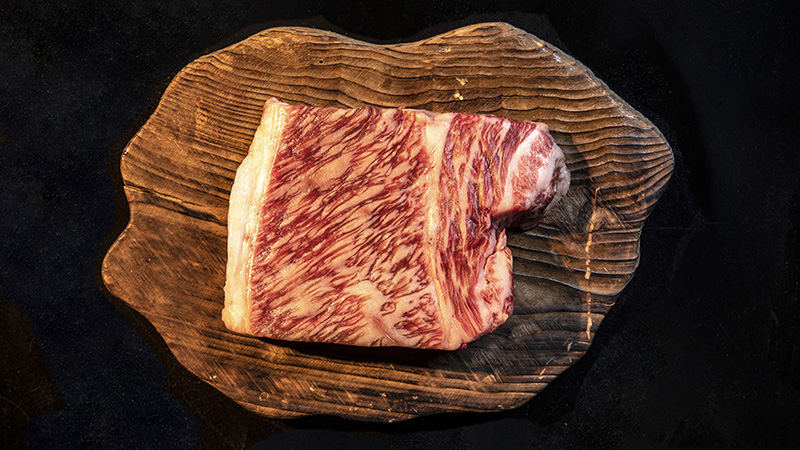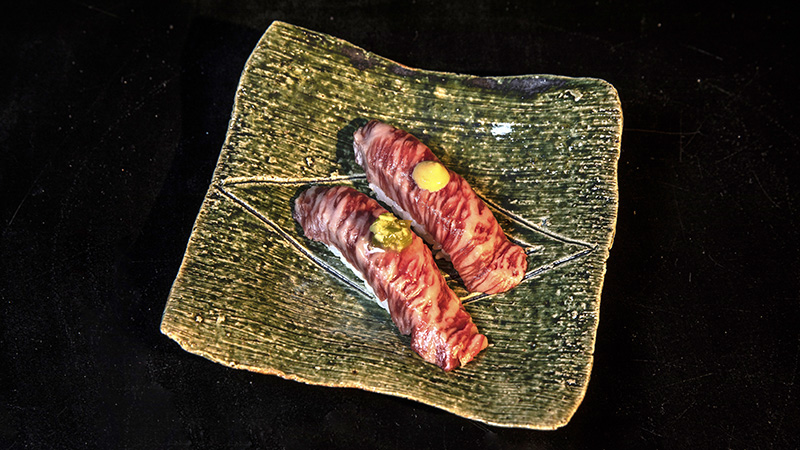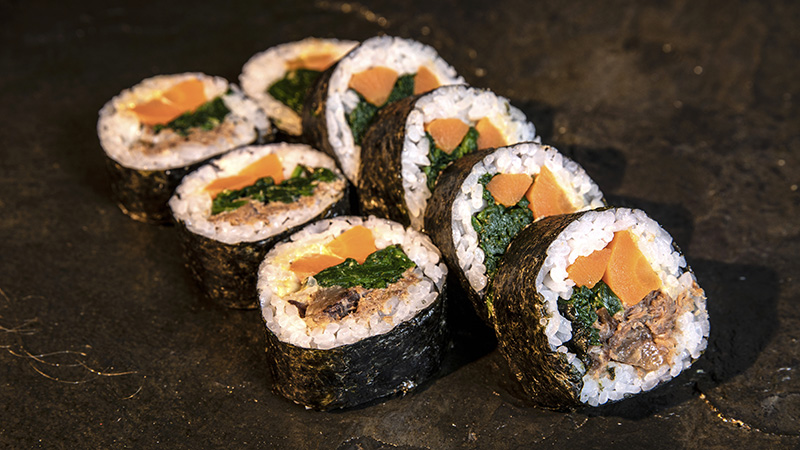DISCOVER THE MAGIC OF JAPANESE CUISINE
Wagyu
Our Restaurant
WAGYU – the experience is worth the money
It is incredible how quickly the word wagyu has become naturalized in our lands. Until recently, only the name Kobe beef was commonly used. In fact, we were late discoverers of this marbled beef that melts on the tongue, because the first were foreign settlers already in 1866, when they first tasted meat from Japanese cows in the ports of Yokohama and Kobe. They liked it much better than the beef they had ever eaten until then, and they started calling it Kobe beef. Kobe, because the first cows for the official needs of foreigners were slaughtered near the city of Kobe. So is better to say Kobe or wagyu? I recommend wagyu. Wagyu is a much broader term and through it we can broaden our knowledge horizons. Yes, in the last few years we have been commonly recognizing marbled beef from various parts of Japan, not only Kobe. You are probably familiar with Tottori beef, offered by the Ambiente group, Yonezawa beef from the Tokyo area, or Miyazaki beef, which we like to use at Miyabi. Most of the time, these are not different breeds of cows, but rather names that express the places where the cows are fattened up until slaughter. When you say Japanese wagyu, 97% of the time it is one breed, bred in the early 20th century from Tajima black cattle by crossing them with cattle from Western countries, mostly from Europe. The famous bull that symbolically stands at the beginning was Tajiri-go from the Atsuta tsuru breed. Tsuru means a cow title, something like breed.
I found it interesting that Japanese cows, in the times before Japan opened up to trade with foreign countries after a long isolation, were valued especially for their gentleness and obedience. And they were not big and could fit to the nerrow roads. The most interesting information is that they were not for food, they were more like helpers on farms. People back then did not make cheese or other dairy products and did not drink milk. Butter, which the Japanese love so much today, was a symbol of something foreign. Inappropriate. When someone said that something smelled of butter, it was derogatory. Bataa kusai. I remember that when I moved to Japan in the late 1970s, buying cottage cheese in a store was a problem and a very expensive delicacy. Beef was also expensive and I always looked forward to going to the Czech Republic for our holiday and eating a good piece of meat. Even today, beef in Japan is not cheap, especially the kind called wagyu. It is just as expensive as it is for us here. Wagyu is indeed expensive.
I myself, although I lived in Japan for fifteen years, tasted Kobe beef in a restaurant in Kobe only when we already had four children and we didn’t even live in Japan. We could finally afford it and, moreover, it was something I longed to experience. That’s why I really understand all of you who want to taste wagyu in the best quality and in the most suitable preparation. It’s a delicacy! It’s extraordinary! It’s worth spending the money!

But it’s important always to check where the specific beef comes from so that you don’t get fooled. If it’s wagyu from Japan, you’ll find information on the packaging that will lead you to the slaughter of the piece and you’ll also find out the entire pedigree up to the third generation. This is absolutely binding and established law for every Japanese producer. You’ll know whether your steak is from wagyu cattle kuroge, akage, mukaku or nihon tankaku. Or even whether it’s a Japanese original, non-crossbred breed called zairai. You will know what the meat yield grade is and what the marbling, color, texture, firmness and shine rating is. You probably won’t be that interested in the yield, but the quality of the meat yes, it matters to you. Quality is determined by 1. marbling – sashi, 2. color, 3. firmness and texture, and 4. shine and fat quality. The rating scale is from 1 to 5, with 5 being the highest grade. And of course you are interested in the appearance of the given marbling, what the aroma is when heated to 80 degrees, how smooth and delicious the taste is in the mouth, and what umami experience you can expect.
There is certainly a big difference whether you have American wagyu, British wagyu or even Czech wagyu on your plate. Each wagyu depends on how much Japanese DNA it has, because the more purebred the particular wagyu is, the more certain you are of the influence of hydroxycarboxylic acids, which are rich in sweet aromas, as well as the influence of oleic acid, which makes the meat melt in your mouth. The meat also contains inosinic and glutamic acids, which are the basis of the umami taste.
As you can see, the world of wagyu is rich and it is good to delve into its secrets. Mr. Josef Muller, wonderful man, who runs a family farm in Mětice near Pardubice with great passion and love with his whole family and is one of the first, if not the first, to start with wagyu in the Czech Republic, can tell you a lot about wagyu. I visited the farm several times and really enjoyed the large airy stable where his cattle peacefully enjoyed the food mixtures that looked so good that I also took some and ate. I liked it! A lot. Mr. Muller, with his generosity, provides us with excellent quality meat at a reasonable price every year so that we can promote wagyu through Miyabi. We cannot have his wagyu on the daily menu, but we organize occasional Wagyu Days when guests can compare the wagyu from Pardubice with wagyu from Japan. I always look forward to those days because I can make myself happy. Wagyu happy. Wagyu is a great joy!

I remember how, as a Japanese housewife and mother, I used to stand in front of the meat department in the nearby Meiji supermarket and look longingly at the thin slices of beef that were so good for sukiyaki. I love sukiyaki! We were a young family with a regular young worker’s salary, and we could only afford beef rarely, and when we did, a maximum of 200 grams per family. Sometimes I also remember how I offended and angered my Japanese husband when he invited me to shabushabu in Kyoto at a noble restaurant in the famous Pontochó district, and I argued that there was not enough meat and that I would rather like to have a good steak. It was our first quarrel and we both considered secretly whether we should better change our minds about our wedding.
We did not change our minds, we married and thanks to our fate, after several years Miyabi was founded in Prague. I am glad that we can offer you guests the Wa, that is, Japan, Japanes culture and with it a harmonious environment with harmonious relationships, because that all is what the Wa symbol means. Wa is also the beginning of the word wagyu and it is a good thing that wagyu has not been changed into Czech transkript as vagjů, because then the figurative meaning of the characters would be lost. Wa 和 means that it is indeed a Japanese thing and that what it is about are cows, i.e. beef – gyuu 牛. When you pronounce wagyu, please lengthen the u to accented u, because cow and beef are gyuu not wagyu. In Czech we say long. And if it helps you, you can say that it is long, because Japanese cows as a species have come a long way to today’s wagyu. It certainly dates back to the 14th century or rather longer and the biggest shock and turning point came when Japan opened up to the world. It was during the Meiji era. At that time, the Japanese discovered their exceptional quality cows along with us foreigners. And you see, today Japanese wagyu cows are known all over the world and farmers do not manage to produce and distribute enough of wagyu meat. Here is one thing left to poit out – it’s good to know that not all cows that are fattened in Japan are wagyu. The others are called local, domestic and are without Wa. Wagyuu are only the exceptional ones, whose meat is so good that it is worth spending your entire paycheck for the special experience. And don’t worry that the fat in wagyu will harm you. Wagyuu oil is similar to olive oil. It contains monounsaturated omega-9 fatty acid in high concentration and breaks down LDL, i.e. bad cholesterol, so that our arteries don’t get clogged.
I wish you good health and I wish you wagyu! Your Miyabi Darja

